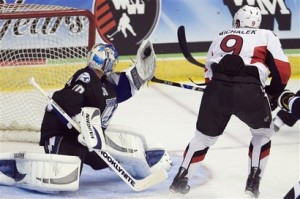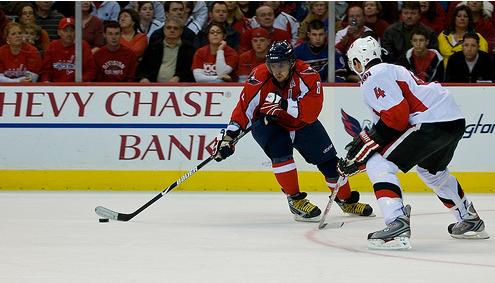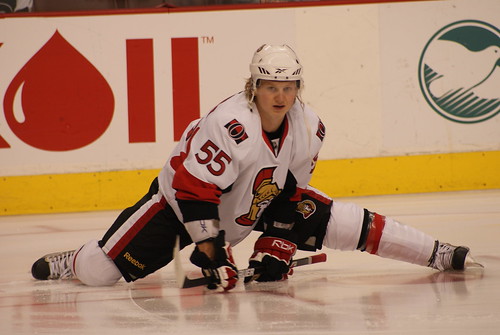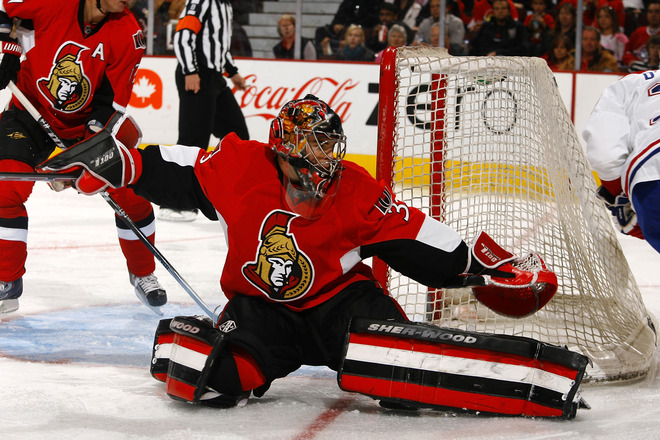Last season was an unmitigated disaster in Ottawa and that disaster extended all the way through the summer in the form of the Dany Heatley trade demand. After beginning the 2008/09 season with Craig Hartsburg behind the bench and a lot of optimism, the Senators faltered early and did not take well to Hartsburg’s tough-love ways. As a result, GM Bryan Murray fired Hartsburg and brought in Cory Clouston to man the bench. Under Clouston, the Senators fared much better, but some would attribute that success to simply being out of the playoff race and, thus, facing less pressure to succeed. Regardless, the Senators entered the summer on a more positive note, until star winger Dany Heatley demanded out.
With the Heatley trade now squarely behind the franchise, let’s take a look at how the Senators might fare in 2009/10.
Forwards
It seems like the Senators have forever been chasing after secondary scoring since the departure of Martin Havlat. Well, with the acquisition of Jonathan Cheechoo, Milan Michalek and signing of Alexei Kovalev, that should no longer be as much of an issue. That said, without production from its two top offensive players, Jason Spezza and Daniel Alfredsson, the Senators will likely be watching the playoffs from their respective couches.
In Spezza, the Senators have arguably one of the most gifted passers in the game today. Over the past four seasons, Spezza has posted assists at a rate of 0.76 per game. That is an impressive number and says a lot about the forward’s tremendous vision on the ice. Sure his skating holds him back some (although it is not as bad as some say) but he makes up for it with strong positioning and his tremendous shot. Averaging 19 minutes 41 seconds of ice-time per game last season, the Senators can stand to see Spezza increase his minutes over the 20:00 minute mark.
Along with Spezza, the Senators boast heart and soul leader Daniel Alfredsson. For all the games I have seen Alfredsson play, I still contest that I gained the most respect for him in Game 5 of the Stanley Cup Final against Anaheim. He was simply doing as much as he could to will his team to a Game 6. While it didn’t happen that night, Alfredsson demonstrated his desire to win that I did not think was matched by anyone else on the team. His age (36) says that he should be slowing down, but his play on the ice says otherwise. Alfredsson is a very good all-around player; he logs significant time on the penalty kill (2:23 minutes per game), power play (4:07 minutes per game) and at even strength (14:22 minutes per game). Additionally, his ability to man the point on the power play with his terrific slap shot and great passing skills make him the team’s jack of all trades.
Joining the Senators this season is the much talked about Alexei Kovalev. We all know that Kovalev is one of the best practice players out there (Gord Miller tells us this every season) but Kovalev also is what he is–a player with immense talent that does not always bring his “A” game every night. Going by his past four on-and-off seasons, Kovalev is due for a rebound year in 2009/10. Considering his immense skill–he has arguably the best shot in the NHL and is a tremendous stick handler–and the team’s capable power play linemates, Kovalev could see a big year on the man-advantage and see his points jump back around his 2007/08 numbers as a result.
The key to the Dany Heatley trade for Ottawa was Milan Michalek. The team has been looking for a player like Michalek for some time now, as he is big, strong, can skate and is not afraid to mix it up. In fact, considering the above mentioned three players, Michalek is a perfect complement to the team’s top six. His age (24) and excitement about being in Ottawa is a refreshing change and he should excel playing with linemates like Jason Spezza and Alexei Kovalev.

Milan Michalek is the type of player the Senators have coveted for some time. (Picture courtesy of yahoo.com)
Also acquired in the Heatley deal was Jonathan Cheechoo. The Moose Factory, Ontario product, as everyone knows, was once a 56 goal scorer. However, he won’t be expected to produce at anything close to that clip in Ottawa. The Senators understand Cheechoo’s limitations, he is not the greatest skater and lacks size, but will put him in a position to hopefully contribute around 25 goals. What Cheechoo lacks in straight skill, he makes up for in work ethic and with his powerful shot and quick release. Given ample time on the power play, Cheechoo should be able to, at least, score 20 goals next season.
With the above mentioned players mainly focused on scoring, Mike Fisher becomes all that more important in Kanata. While the 29 year old receives some flack over his production when taking into account his$4.2 million cap hit, he still brings a lot of valuable traits to the table. He was the Senators most physical player last season (led the team with 211 hits), wins face-offs at over a 50% clip (51.2% last season) and was second amongst the team’s forwards in blocked shots (54). Combine that with his ability to score over 20 goals (prior to last season he had three straight 20+ goal seasons) and the Senators are banking on a rebound season from the Peterborough native.
If the Senators are to take a step in the right direction this season, the play of Nick Foligno will play a vital role. Nick Foligno brings a strong work ethic to the table and seems to really be finding his NHL game. The 2006 first round draft pick played in 81 games last year and totaled a rather impressive 17 goals. Considering he only played 13:40 minutes per contest, Foligno should see his totals rise this year with more responsibility. Additionally, his desire to play a physical game (97 hits) is a welcome sight for many fans.
The play of some of the team’s younger players is admittedly key, but Ottawa fans are hoping that they will see a rebound season from Chris Kelly. The 28 year old Toronto native disappointed last season while making a fairly significant $2.5 million. Counted on in the face-off department the year before, Kelly dropped down to a paltry 47.4 face-off winning percentage in 2008/09. Moreover, his scoring totals decreased to 23 points from 38 and his checking abilities seemed to fall by the wayside, as he was a -10 in terms of +/-. GM Bryan Murray has already let it be known the same type of play won’t cut it this season.
After his much rumored departure, Chris Neil ended up staying with the Senators and signing a four-year deal, with a cap hit of $2.0 million per season. The rugged winger is still counted on to defend teammates and let it be known that the Senators can be a difficult team to play against. After all he has done for the Senators over the years, there is a reason he is a fan favorite in the Nation’s Capital. Last season he led the Senators with 146 penalty minutes, although he did a good job of cutting down his minor penalties from the previous year.
Joining Neil as a player who is difficult/annoying to play against, is Jarkko Ruutu. The Finnish winger specializes in aggravating opposing players. Ruutu is already 33 years old, so his game is not going to change at this point. As long as he is getting into players’ faces and causing trouble, Bryan Murray has to be happy because that is what he signed him to do.

Will Ruttu continue to annoy the opposing teams forwards? (Phillip MacCallum/Getty Images)
Joining Foligno as one of the team’s important youngsters is Jesse Winchester. Winchester, expected to be out of action for three weeks with a knee injury, brings good energy to the table. He is physical (116 hits) and made the most of his 10:35 minutes of ice-time per game last season.
A couple players that non-Ottawa fans may not know much about are Peter Regin and Zack Smith. Both players have acquitted themselves well in training camp and may challenge for spots up front. Regin is only 23 and transitioned well to the AHL last season. Combine his 47 AHL points in 56 games with his performance this training camp and you can see why Cory Clouston is giving the responsible two-way center every chance to make the club (possibly as a winger).
In Smith, the Senators have a 21 year old forward who is not afraid of the rough stuff. He compiled 132 penalty minutes in the AHL last season in 79 games and added in 24 goals and 24 assists for good measure. Even if he does not make the Senators out of training camp, I’d be surprised if he did not see some time up with the club throughout the season.
Finally, the Senators have Ryan Shannon, a player that impressed many with his performance at the World Championships in 2009. What’s more is that the diminutive player added in 20 points in only 35 games with the Senators after being acquired from the Canucks last season. People forget that Shannon is only 26 years old, so he still has the potential to improve some over the next year or two–if given the opportunity.
Defensemen
Last season, the Senators most-relied on defenseman was Filip Kuba. Kuba does not get much press, but he is very sound at almost every aspect of the game. He logged 23:16 minutes per game last season, and can contribute on both the power play and penalty kill. He is not the best skater or the most physical player, but he has good size and positions himself quite well. There is a reason the Senators signed him to a three-year deal, at $3.7 million per season as a cap hit. The 32 year old Czech defenseman is not a protypical top line defenseman, but he does his job quite well.
Joining the veteran Kuba on defense is the ever-dependable Chris Phillips. The Alberta native is one of the more understated players in the game today. He is the consummate team player who is willing to hit (114 hits last season), block shots (114 last season) and sacrifice his body to win. He is not the fastest skater, nor does he possess much offensive upside, but he is the type of player that every team needs to win.

Chris Phillips faces Alex Ovechkin. (Photo: Allen Clark/Off Wing Photo.com)
Phillips’s long-time partner on defense has been Anton Volchenkov. The 27 year old Russian defenseman is entering a contract season and will be a UFA after 2009/10. Considering his age and solid play, the Senators may want to lock him up quick. Volchenkov led the team in blocked shots last season (180) and hits (182). Moreover, he hits as hard as anyone in the National Hockey League and makes forwards skate with their heads up at all times. He does not bring much to the table offensively, and did struggle at times defensively last season, but the team as a whole struggled and Volchenkov has proven himself to be above that poor play.
With Phillips and Volchenkov taking care of the physical part of the game, the smaller Chris Campoli will be counted on to add offense to the team’s back-end. Acquired as the centerpiece of the Mike Comrie deal last season, Campoli skates really well and can move the puck quickly out of his own zone. In his limited time on the Ottawa power play last season, Campoli looked comfortable quarterbacking from the blue line and should help the team’s transition troubles from last season. He could stand to improve in his own zone and does tend to get muscled off of pucks, but overall he should add a nice offensive element to the team’s blue line.
The Senators’ final two defense spots should be interesting. Brian Lee carries some offensive prowess but lacks in the physical play department and makes questionable defensive decisions. As well, his ability to quarterback the power play should be better considering his skill level.

Can Brian Lee step up at this level?
Lee will be battling it out for ice-time with the likes of Alex Picard. Picard, acquired from Tampa Bay in the Andrej Meszaros trade, has some offensive upside but lacks consistency and brings many of the same traits to the table as Lee does.
Along with Lee and Picard, the Senators boast tremendously talented youngster Erik Karlsson. The Swedish rearguard is a tremendous skater and moves the puck beautifully. He possesses all the talent to become a top NHL rearguard and may come quicker than some anticipated.
Finally, the Senators have been very impressed with the play of 28 year old Matt Carkner. He has been a career AHL defenseman but brings a great willingness to compete in all aspects of the game and is a big body. If the Senators are not content with the performance of some of the aforementioned defensemen, do not be surprised to see Carkner steal some ice-time.
Goaltenders:
Two of the three goalies who played for the Sens last season are gone (Auld to Dallas, Gerber to Toronto/KHL’s Atlant Moscow) with Brian Elliott, who split his time between Binghamton of the AHL and the parent club, remaining. His role is to back-up the now healthy Pascal Leclaire who the Sens picked up from Columbus last season for Antoine Vermette.
Leclaire is an engima wrapped in a riddle as he has the potential to be a strong number 1 goaltender for the Senators this season but this is totally contingent on his staying healthy. All indications are that he spent the summer rehabing (after missing the final 48 games of last season with an ankle injury) and Ottawa hasn’t rushed his return. Although it appears that this is about to change as Coach Clouston told the Ottawa Citizen about Leclaire’s playing time;
The only way he can kind of get the rust out, get himself feeling good, get himself back in game shape, is to play and play lots.

- (Photo by Phillip MacCallum/Getty Images)
The Sens have to hope that Leclaire is 100% healthy and can return to his 2007/08 numbers that he had with the Blue Jackets when he went 24 W 17 L had .919 save % (11th) and a 2.25 GAA (7th). If he can do this, then the Senators could (stress could) expect big things from their back end.
Ceiling: The Senators improve their even strength scoring, get improved play from their defense and Pascal Leclaire plays at least 55 games. 2nd in Northeast Division and 6th in the Eastern Conference.
Floor: The team’s defense continues to struggle getting the puck up to the team’s forwards, chemistry becomes an issue up front with three scoring newcomers and injury trouble hits in between the pipes. 5th in the Northeast Division and 14th in the Eastern Conference.



